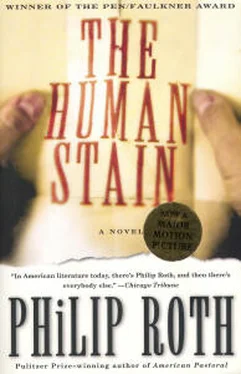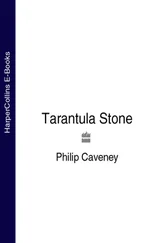When we reached South Ward Street and I parked the car outside the College Arms, I said, “I'd like to meet Walter sometime. I'd like to talk to Walter about Coleman.”
“Walter hasn't mentioned Coleman's name since nineteen hundred and fifty-six. He won't talk about Coleman. As white a college as there was in New England, and that's where Coleman made his career. As white a subject as there was in the curriculum, and that's what Coleman chose to teach. To Walter, Coleman is more white than the whites. There is nothing beyond that for him to say.”
“Will you tell him Coleman's dead? Will you tell him where you've been?”
“No. Not unless he asks.”
“Will you contact Coleman's children?”
“Why would I?” she asked. “It was for Coleman to tell them. It's not up to me.”
“Why did you tell me, then?”
“I didn't tell you. You introduced yourself at the cemetery. You said to me, 'You're Coleman's sister.' I said yes. I simply spoke the truth. I'm not the one with something to hide.” This was as severe as she had been with me all afternoon — and with Coleman. Till that moment she had balanced herself scrupulously between the ruination of the mother and the outrage of the brother.
Here she drew a wallet out of her handbag. She unfolded the wallet to show me one of the snapshots that were tucked into a plastic sleeve. “My parents,” she said. “After World War I. He'd just come back from France.”
Two young people in front of a brick stoop, the petite young woman in a large hat and a long summer dress and the tall young man in his full-dress army uniform, with visored cap, leather bandoleer, leather gloves, and high sleek leather boots. They were pale but they were Negroes. How could you tell they were Negroes? By little more than that they had nothing to hide.
“Handsome young fellow. Especially in that outfit,” I said. “Could be a cavalry uniform.”
“Straight infantry,” she said.
“Your mother I can't see as well. Your mother's a bit shaded by the hat.”
“One can do only so much to control one's life,” Ernestine said, and with that, a summary statement as philosophically potent as any she cared to make, she returned the wallet to her handbag, thanked me for lunch, and, gathering herself almost visibly back into that orderly, ordinary existence that rigorously distanced itself from delusionary thinking, whether white or black or in between, she left the car. Instead of my then heading home, I drove cross-town to the cemetery and, after parking on the street, walked in through the gate, and not quite knowing what was happening, standing in the falling darkness beside the uneven earth mound roughly heaped over Coleman's coffin, I was completely seized by his story, by its end and by its beginning, and, then and there, I began this book.
I began by wondering what it had been like when Coleman had told Faunia the truth about that beginning — assuming that he ever had; assuming, that is, that he had to have. Assuming that what he could not outright say to me on the day he burst in all but shouting, “Write my story, damn you!” and what he could not say to me when he had to abandon ( because of the secret, I now realized) writing the story himself, he could not in the end resist confessing to her, to the college cleaning woman who'd become his comrade-in-arms, the first and last person since Elbe Magee for whom he could strip down and turn around so as to expose, protruding from his naked back, the mechanical key by which he had wound himself up to set off on his great escapade. Ellie, before her Steena, and finally Faunia. The only woman never to know his secret is the woman he spent his life with, his wife. Why Faunia? As it is a human thing to have a secret, it is also a human thing, sooner or later, to reveal it. Even, as in this case, to a woman who doesn't ask questions, who, you would think, would be quite a gift to a man in possession of just such a secret. But even to her — especially to her. Because her not asking questions isn't because she's dumb or doesn't want to face things; her not asking him questions is, in Coleman's eyes, at one with her devastated dignity.
“I admit that may not be at all correct,” I said to my utterly transformed friend, “I admit that none of it may be. But here goes anyway: when you were trying to find out if she'd been a hooker ... when you were trying to uncover her secret...” Out there at his grave, where everything he ever was would appear to have been canceled out by the weight and mass of all that dirt if by nothing else, I waited and I waited for him to speak until at last I heard him asking Faunia what was the worst job she'd ever had. Then I waited again, waited some more, until little by little I picked up the sassy vibrations of that straight-out talk that was hers. And that is how all this began: by my standing alone in a darkening graveyard and entering into professional competition with death.
“After the kids, after the fire,” I heard her telling him, “I was taking any job I could. I didn't know what I was doing back then. I was in a fog. Well, there was this suicide,” Faunia said. “This was up in the woods outside of Blackwell. With a shotgun. Bird shot. Body was gone. A woman I knew, this boozer, Sissie, called me to come up and help her. She was going up there to clean the place out. ‘I know this is going to sound odd,’ Sissie says to me, ‘but I know you have a strong stomach and you can handle things. Can you help me do this?’ There was a man and woman living there, and their children, and they had an argument, and he went in the other room and blew his brains out. 'I'm going up there to clean it out,' Sissie says, so I went up there with her. I needed the money, and I didn't know what I was doing anyway, so I went. The smell of death. That's what I remember. Metallic. Blood. The smell. It came out only when we started cleaning. You couldn't get the full effect until the warm water hit the blood. This place is a log cabin. Blood on the walls everywhere. Ba-boom, he's all over the walls, all over everything. Once the warm water and disinfectant hit it ... whew. I had rubber gloves, I had to put on a mask, because even I couldn't take this anymore. Also chunks of bone on the wall, stuck in with the blood. Put the gun in his mouth. Ba-boom. Tendency to get bone and teeth out there too. Seeing it. There it all was. I remember looking at Sissie. I looked at her and she was shaking her head. ‘Why the fuck are we doing this for any amount of money?’ We finished the job as best we could. A hundred dollars an hour. Which I still don't think was enough.”
“What would have been the right price?” I heard Coleman asking Faunia.
“A thousand. Burn the fucking place down. There was no right price. Sissie went outside. She couldn't handle it anymore. But me, two little kids dead, maniac Lester following me everywhere, on my case day and night, who cares? I started snooping. Because I can be that way. I wanted to know why the hell this guy had done it. It's always fascinated me. Why people kill themselves. Why there are mass murderers. Death in general. Just fascinating. Looked at the pictures. Looked if there was any happiness there. Looked at the whole place. Until I got to the medicine cabinet. The drugs. The bottles. No happiness there. His own little pharmacy. I figure psychiatric drugs. Stuff that should have been taken and hadn't. It was clear that he was trying to get help, but he couldn't do it. He couldn't take the medication.”
“How do you know this?” Coleman asked.
“I'm assuming. I don't know. This is my own story. This is my story.”
“Maybe he took the stuff and he killed himself anyway.”
“Could be,” she said. “The blood. Blood sticks. You could not possibly get the blood off the floor. Towel after towel after towel. Still had that color. Eventually it turned more and more a salmon color, but you still couldn't get it out. Like something still alive. Heavy-duty disinfectant — didn't help. Metallic. Sweet. Sickening. I don't gag. Put my mind above it. But I came close.”
Читать дальше












